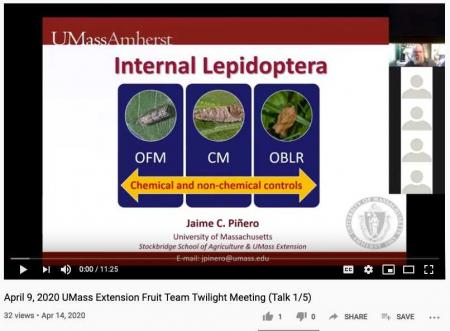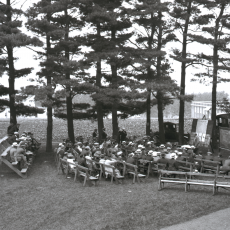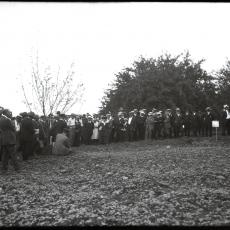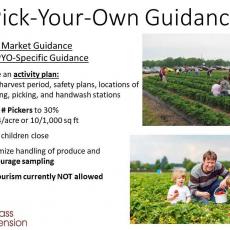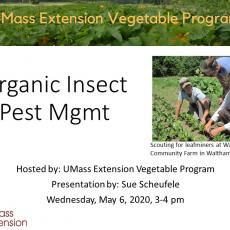Ahhh, twilight meetings: much-anticipated moments for farmers. For decades, growers, farmers and agricultural workers across Massachusetts have come to depend upon first-hand expertise from extension educators about emerging pests, other threats and new research findings in order to produce healthy harvests. Up until last year, growers often gathered at regional farms to glean current knowledge and to swap advice.
So what do Extension and Massachusetts growers do when a coronavirus pandemic changes the in-person meet up? They pivot: information now flows virtually, over Youtube channels, conference calls and zoom meetings.
Fruit Program Twilight Meetings on YouTube
The team at the UMass Extension Fruit Program has created a new YouTube channel. Clips from past virtual twilight meetings are available there as will future IPM-oriented videos.
Elizabeth Garofalo, UMass Extension fruit educator, explains innovative steps they have taken during the coronavirus pandemic to continue to reach out and help growers, as they have always done. She said, “Every spring, the UMass Extension Fruit Program organizes a series of time-sensitive twilight meetings held throughout the state and in collaboration with extension colleagues in Rhode Island and Connecticut. These meetings are not only opportunities to provide growers with the crop and pest management information they need- when they need it- but also a chance for community-building, commiserating and celebrating. We all rely on each other to make our research and our farms successful. We decided to establish conference call-based twilight meetings in an effort to continue to provide information sharing and community support.”
Upcoming meetings are planned to coincide with significant management events in tree fruit production. For example Professor Duane Greene, Stockbridge School of Agriculture, provided critical crop load management information around apple bloom time. Fruit specialist Sonia Schloemann, UMass Extension, advises growers on best management practices for spotted wing drosophila as the first of the small fruit crops begin to ripen.
Feedback has been quick and positive. One grower wrote, "Just wanted to say thank you to everyone who helped put together the twilight meeting last week. It worked very well! I like the zoom meetings vs field visits for the most part.” Another replied, “Nice session last evening, this was my first. Dad and I sat through it and got a lot out of it."
Schloemann chimes in, “Attendance and interest in our zoom twilight meetings has been very strong. The first zoom twilight we held in early April had 57 attendees and the second one had over 75. They went smoothly with minimal technical glitches and we were able to award pesticide recertification credits successfully.” There have been up to 30 additional views after the meeting.
Growers say that the aspect of in-person twilight meetings that they miss most is personal connection with each other (side conversations, meeting new people), and they don't get a chance to network and socialize in the same way. Schloemann says, “We also don't have the farm/orchard tour component where people get to see examples of things that we want to illustrate or demonstrate in person. We have some incredibly resilient and resourceful fruit and vegetable growers in the state who are working hard on adapting and adjusting to this new challenge and are committed to producing safe and healthy food for their customers,” she said.
The last online twilight session is June 4, 2020 5:30. The topic is post-bloom insect and disease management and crop thinning. One pesticide credit will be offered. Register in advance for this meeting here/ The fruit team is planning similar programming to keep the grower community in the loop and connected as the summer progresses.
NEW! Listen to “Fruit Loop,” a fun podcast led by Elizabeth Garofalo and student team member Lyndsey Ware. This is the audio version of the UMass Extension Fruit Team's Heathy Fruit Newsletter.
Vegetable Program Mini-Twilight Meetings Every Two Weeks
The UMass Extension Vegetable Program began holding weekly virtual mini-twilight meetings at the end of April, in order to stay connected with farmers while working remotely. Sue Scheufele, vegetable extension educator says her team has tried out a few online formats. In a recent survey, farmers gave feedback on virtual twilight meetings, and based on that feedback, these meetings [embed link to webpage here] will be held at 6pm, instead of 3pm, and after May 27, they will be held every other week. Recordings of past calls will also be available at that link. Webinar topics are geared towards commercial farmers. Register here.
What will you experience? The Vegetable Program prepares a topic for presentation and discussion. At most meetings, there are PowerPoint presentations with plenty of time for questions and discussion on all calls. Attendees are muted on the calls but can un-mute themselves to ask questions and can also submit comments and questions through a chat box.
These webinars cover a wide variety of topics, including: scouting; IPM; specific crop or pest-related issues; soil health; cover crops; high tunnel production; covid19-related updates; marketing adaptations and more. Pesticide recertification credits may be available for some topics.
A recent vegetable twilight meeting featured Tom Smiarowski, extension risk management/crop insurance educator. He helps farmers understand new programs designed to support them and offers assistance on how to apply for and then practically implement new programs. His contact is tsmiarowski@umass.edu
An exciting new initiative from the USDA to get food to those that need it is called the Farmers to Families Food Box Program. This is a federal program that puts money into local produce in new ways with a food box distribution program. The USDA has contracted food distributors to put together containers of fruits, vegetables, products and pork products to distribute to local non-profits (food banks, food pantries) for distribution to community members in need. 30 distributors were chosen in the Northeast. The full list of distributors given contracts under this program is available here.
More Information Related to Fruits and Vegetables
In this fast-changing landscape, marketing adjustments are being put into place to get products to people. Information is rapidly evolving on CSA pickups and farmer’s market changes. MDAR has released guidance for the safe operation of essential farm businesses, including guidance on farmers’ markets, farm stands, CSAs, and, most recently, pick-your-own (PYO) operations. PYO guidance is available here.
